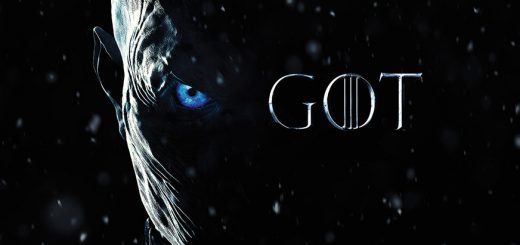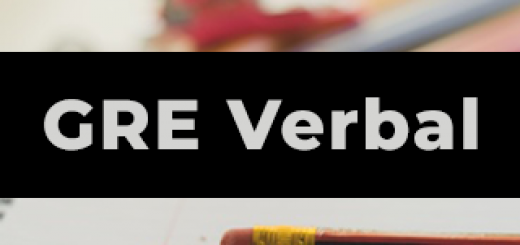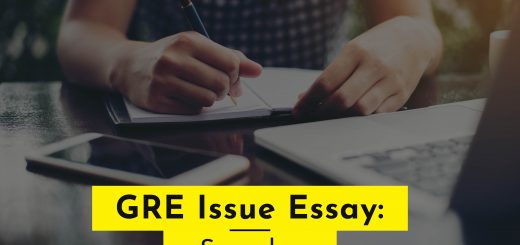GRE Verbal : Techniques to get started with Reading Comprehension
“GRE Reading Comprehension is too tricky and difficult”
This is one of the most frequent statement you would hear from students who have already taken their GRE.
50% of the question in the GRE Verbal section, actually appear from Reading Comprehension. Many students find the Reading Comprehension section the toughest of all. Some even tend to get discouraged after attempting a few questions. While there is no denying that this is a difficult section, there is definitely hope to score well. In order to score above 160 in the Verbal section, you need to be cool-headed and confident about multiple factors like GRE words, sentence structures, grammar and analytical reading.
Should you read fast or read smart? Should you read the passage first or should you go through the question first and then read the passage?
Let me throw light on some simple, yet efficient strategies that can help you tackle Reading Comprehension with confidence.
1. Read, read, and read.
Yes, the first tip is read, read, and read. Read from a wide range of publications—newspapers, magazines, opinion pages, editorials, journals, etc. This will give you exposure to different kinds of writings. The biggest mistake GRE aspirants commit is that they spend less time reading topics they are least interested in. Reading long articles about science, geography, history, law, sports etc. can help you come out of your comfort zone. Passages in GRE Reading Comprehension actually come from these topics and so gaining expertise in reading these topics is the most basic step in mastering RC.
The following are some of the reliable sources you can use for improving your reading.
a) Editorials from Hindu
b) The Hindu Magazine
c) The Economists
d) Wall Street Journal
e) Scientific American
f) Aldaily.com
g) The Caravan magazine
Download our free eBook on cracking tough RC passages. Learn all the techniques that can help you master RC.
2. Read the entire passage first
While most of the students tend to read the question and the answer choices first, they obviously invite trouble by searching for the right context clue inside the passage. The majority get lost somewhere in between and waste time.
So the thumb rule is,
Do not get into the questions/options directly.
The passage is constructed in such a way that it seems to be extremely tricky. The test designers add attractive words and those words are subtly added in the questions to confuse the test taker. Also, after reading the answers you start framing skewed judgments’ which becomes difficult to vanquish later. Thus, best is to go by the traditional way – Read the entire passage and then start answering.
3. Read Analytically
Analytical reading is a proven technique to build your comprehending skills. Even as you read, learn to analyze the writing and mentally make note of the following:
- What is the main idea/purpose of the writing?
- Is the author making a strong point in the writing?
- Is there a conflict stated or is there a concurrence of thought?
- Are there examples provided/parallels drawn?
- Are difficult ideas explained clearly? Are they subject to various interpretations?
- Are illustrations, evidences, and examples effective?
- Is there an argument in the article?
- Is the argument convincing? Logical? Authoritative?
- How does this article fit relative to other authors on the subject?
- Is this article describing a new event or thing, or is it another example of something familiar?
You need breaks in the flow of ideas, so that you can assimilate what you have read, and then move on. You can break a long sentence into short manageable units, from which you can understand ideas easily. One way to read analytically is to skim the text first and then return to a deeper reading. You might highlight relevant passages, take notes or jot down thoughts on a particular character or theme as you read. You may also understand the goals of a character or read it from a historical perspective.
Click here to view the video tutorial on Analytical Reading. Learn from an expert RC trainer.
4. Improve your accuracy
The key is not to read faster, but to read smarter. Intelligent reading means knowing when to pay attention and when to relax. You shouldn’t skim or skip any parts of the passage as you read, but you should slow down and pay more attention to important parts, and speed up and pay less attention to the unimportant parts. The best way to improve is to work with passages, identify where you went wrong, and ensure you got it right for the right reason. Critical thinking is the ability to question, analyze, and understand the context of information before you accept or reject it. Train yourself to question and process different types of information by setting daily habits. The goal is not to come to a conclusion, but to be able to understand what you can and cannot know from the evidence. Putting words on paper will help you visualize and evaluate them more critically.
If you would like to practice a actual GRE style reading comprehension question, click here.
5. Take Notes
While practicing, it is good idea to take notes for medium sized and long passages in RC. When you take notes:
- Be brief; capture only the essence of the points from the passage
- Use short-forms and abbreviations to save time
- Do not jot ideas or points that have been clearly articulated in the passage. Capture only the impression that you get from those lines, or the author’s impression. You can always revisit the passage and read the details if there is question based on this impression.
- Capture the essence of the author’s observation/assertion/opinion/view
Lets now apply all these techniques to this passage.
RC, Question 1
Some scientists claim that mankind’s brain power has reached its peak. Simon Laughlin, professor of neurobiology, has said that the brain must consume energy to function and that these requirements are sufficiently demanding to limit our performance. Far-reaching powers of deduction demand a lot of energy because for the brain to search out new relationships, it must constantly correlate information from different sources. Such energy demands mean there is a limit to the information we can process. The cleverest people have the best wiring, with messages carried very quickly between different parts of the brain.
Q.1. According to the passage, which of the following are true?
- Environmental impulses travel slower in smarter people and faster in those who are less intelligent
- Formation of efficient networks within the brain seems to be associated with high IQ
- Becoming smarter means improving connections between different brain areas, but meeting energy needs could still pose a limit
Clues & Answers
“the brain must consume energy to function ………………….with messages carried very quickly between different parts of the brain”
From these lines, you understand that the brain requires energy to process information. To stretch its ability in deducing a correlation or in identifying a relationship, a tremendous amount of energy is required to do so. This requirement, most of the times, can become an unmatched demand. Only the smartest in the set with excellent neuron network can possess good deducing abilities while the rest are left with a limit on the amount of information one can process. This leads to option B and option C.
***Now here is the challenge***
Why do you think Option A is not the right answer?
Comment the right answer below. C’mon, it’s not that difficult!
If you have any doubts, you can post them in the comment box and I’ll personally answer them.
Happy learning with AdmitEDGE!








Regarding the option 2 in the above passage.
There is no mention of the IQ in the entire passage. Also, no mention of correlation between cleverness and IQ is present. So, I suppose B is not right. (As one cannot just assume that cleverness implies IQ – this brings the external knowledge into picture which is kind of prohibited).
In the option a they talk about impulses whether in the passage there is no such statement about environment impulses so therefore A is not correct. And about B there is no mention of corelation between iq and smartness so b is in correct. And in C it is clearly stated that brain find new relations and the cleverest people have better handwriting. So the ans is C